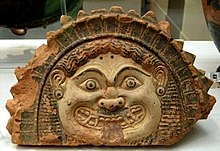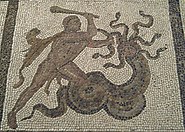
Back Medusa Afrikaans ميدوسا Arabic মেডুছা Assamese Medusa (mitoloxía) AST Qorqona Meduza Azerbaijani Медуза горгона Bashkir Medusa BCL Гаргона Медуза Byelorussian Медуза (митология) Bulgarian মেডুসা Bengali/Bangla
| Medusa | |
|---|---|
 Classical Greek gorgoneion featuring the head of Medusa; fourth century BC | |
| Personal information | |
| Parents | Phorcys and Ceto |
| Siblings | The Hesperides, Sthenno, Euryale, The Graeae, Thoosa, Scylla, and Ladon |
| Consort | Poseidon |
| Children | Pegasus and Chrysaor |
| Part of a series on |
| Greek mythology |
|---|
 |
| Deities |
| Heroes and heroism |
| Related |
|
|
In Greek mythology, Medusa (/mɪˈdjuːzə, -sə/; Ancient Greek: Μέδουσα, romanized: Médousa, lit. 'guardian, protectress'),[a] also called Gorgo (Ancient Greek: Γοργώ)[b] or the Gorgon, was one of the three Gorgons. Medusa is generally described as a woman with living snakes in place of hair; her appearance was so hideous that anyone who looked upon her was turned to stone.[4] Medusa and her Gorgon sisters Euryale and Stheno were usually described as daughters of Phorcys and Ceto; of the three, only Medusa was mortal.
Medusa was beheaded by the Greek hero Perseus, who then used her head, which retained its ability to turn onlookers to stone, as a weapon[5] until he gave it to the goddess Athena to place on her shield. In classical antiquity, the image of the head of Medusa appeared in the evil-averting device known as the Gorgoneion.
According to Hesiod and Aeschylus, she lived and died on Sarpedon, somewhere near Cisthene. The 2nd-century BC novelist Dionysios Skytobrachion puts her somewhere in Libya, where Herodotus had said the Berbers originated her myth as part of their religion.
- ^ The American Heritage Dictionary Of The English Language By Editors Of The American Heritage Dictionaries.
- ^ OED 2001 revision, s.v.; medein in LSJ
- ^ Harper, Douglas. "gorgon". Online Etymology Dictionary.
- ^ Brill's New Pauly, s.v. Gorgo.
- ^ Bullfinch, Thomas. "Bulfinch Mythology – Age of Fable – Stories of Gods & Heroes". Archived from the original on 2011-07-07. Retrieved 2007-09-07.
...and turning his face away, he held up the Gorgon's head. Atlas, with all his bulk, was changed into stone.
Cite error: There are <ref group=lower-alpha> tags or {{efn}} templates on this page, but the references will not show without a {{reflist|group=lower-alpha}} template or {{notelist}} template (see the help page).
© MMXXIII Rich X Search. We shall prevail. All rights reserved. Rich X Search